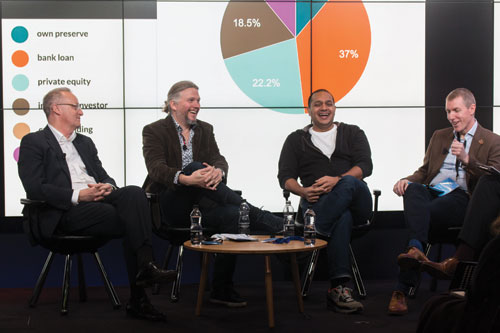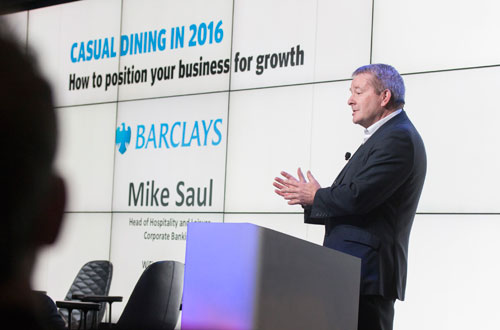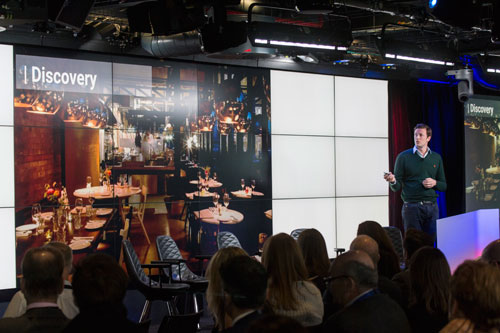How to tap into the casual-dining boom
Last month, The Caterer brought together the industry big-hitters to discuss the world of casual dining at a breakfast event in partnership with Barclays and host partner Google. Brendan Coyne reports
Casual dining is booming and operators are looking to ride the wave. But what are the key ingredients to expanding successfully? In partnership with Barclays, The Caterer brought together a panel of restaurateurs and funding experts at Google Town Hall to discuss both the raw ingredients and the methodology of expansion.
The key to expansion is quite simple, said Sticks ‘n' Sushi managing director Andreas Karlsson. "It comes down to people and property." The two elements are interwoven. The better the operating team in each restaurant, "the less people like myself are an expensive overhead," said Karlsson. "So our focus is to ensure each restaurant can take care of their business. Then you can grow, but at a reasonable pace. What we do is not fast, we don't copy and paste."
Getting the right people boils down to "hire slowly and hire early," he said. The group also asks its 250 staff to recommend their next colleagues when it needs to hire, leveraging their social networks.
Karlsson said it was also vital to engage locals and not take success for granted. "We approached Cambridge as if we didn't have any restaurants in the UK. You need to be humble, knock on doors, ask people to give you
a chance. By doing that you build a good relationship with your initial guest who will hopefully like what you do and spread the word. "So humbleness is crucial. Don't be overconfident because of your success somewhere else."
The right site
Securing the right site is also vital, even though, as Brasserie Blanc's Ian Edward said, more sites are coming to market and councils are freer with licences.
"If you get the wrong site, you have a potential asset that very quickly turns into a liability. It can be difficult to get rid of," he said. "If you get a great site, and you don't operate it very well, you will be able to offload it. But you will probably lose all your fixtures and your fittings and a fair amount of your premium. If you are in the wrong place you may well be wearing it for a very long time and that is not much fun. So get it right first time."
That means being patient and planning years ahead, added Karlsson. "With property, if you want to open in a couple of years, you have to start [looking and planning] now."
The right people
Karlsson said Sticks 'n' Sushi's long-term goal was to expand into the rest of the UK, but that it would take a modular approach. "Our strategy is to build clusters [like in the South East], because without the people [to support expansion] we can't go anywhere."
Edward believes that the hospitality industry needs to articulate more clearly the careers - and money - to be made from catering. "We need to present ourselves as an attractive opportunity. At the moment [young
people] come in during their holidays and do incredibly well. They are very bright, they work things out that maybe the manager can't see… and then they go and become an accountant," he said. "That's a great shame. We have to work out how to present ourselves at Oxford, Cambridge, the red brick universities - and retain the right people."
Edward cited Pizza Pilgrim co-founder Thom Elliot as a potential poster boy for success. "Thom is an Oxford graduate. In two to three year's time, if things go well, he will be a very wealthy guy - a lot more than he would
make from accountancy. It would be nice if we had a forum to debate that so we could actually go out as an industry and illustrate that leap for [other graduates]."
Karlsson said it was equally important to let people find their own path. "Accommodate their lives and needs and create loyalty to your brand. They might go off and do something else, but they might come back," he said. "If you can add a bit of education and invest in them, then you can create a career for them. They might not all be entrepreneurs like the Pizza Pilgrims guys, but you can help create great lives for them."
What bank managers want
Getting both the right people and the right site requires funds. Operators seeking bank debt would do well to build a strong management team above all else, suggested Barclays' industry director for hospitality and leisure
Philip Richardson.
"You have to look at the underlying business case on its merits. The three planks for us are sustainability of earnings, proof of concept and a strong management team," he said. "We are willing to deploy capital into businesses
that have a strong management team that might not necessarily have that proof of concept. Because those operators have been there, seen it and got the T-shirt."
But for operators that presents a conundrum: "Do you resource the head office and allow for that growth or do you grow and then resource the head office? That is a conversation we are having with a number of operators."
Karlsson said that was a straightforward decision for his business. "There are a few positions in terms of strengthening the team around me that will be put in place. But you can't build the overheads faster than your turnover
because you will be in trouble."
Dishoom founder Kavi Thakrar agreed. The business has a head office of seven, which might sound top-heavy, but its King's Cross restaurant alone has 180 staff. "It's a balance and timing is important. You can't scale up to that level when you don't have the money to pay for it," he said.
What about crowdfunding?
Philip Richardson from Barclays said that crowdfunding may be flavour of the month for the trade press, but it only forms a small part of the funding mix. "It will work for some, but not all," he said. "My concern is around some of the leverage multiples that you see with some of the businesses being crowdfunded."
Ian Edward agreed, and feared that if deals turned sour the entire industry could suffer. "[Crowdfunding] has become very emotional with people paying silly prices. The bonds that have been done for small businesses
with a patchy record are bonkers. My biggest concern is that some of them are going to go wrong, and when they do, how does the world react? If the media reacts in a very bad way and MPs get on the back of it, who knows where it might lead?"
Legislation, he said, "has been the biggest driver of value in most of the leisure sector over the last 30 years. Whether it is gross profit tax or the beer laws in 1989. These things can massively change the industry and we don't
want to see it happen for the wrong reasons."
Restaurant operators warn over Brexit
Restaurant operators have warned that investor uncertainty in the event of a vote to leave the EU could cause the booming food and drink sector to nosedive. Polled at The Caterer's casual-dining summit, 82% of
the audience said they would vote to remain in the EU. Ian Edward, a non-executive chairman at Brasserie Blanc, said voting for political reasons was "a bit like asking a Chelsea fan whether they want Spurs or
Leicester to win the title… But for business reasons it is a no-brainer, we have to stay in."
Edward said that the current bubble of investment in the sector, driven by "30% returns" for investors that back the right operators, would pop in the event of an out vote. "I think people are sitting on the fence. If [the vote] goes negative, I think investment will fall very quickly."
Andreas Karlsson, managing director of Sticks 'n' Sushi, agreed that while a run on the pound in the event of an exit could bring in more overseas visitors, Brexit would not be positive for his business.
"I don't think we would have half of Europe [coming over] to eat at our restaurants. "Sticks 'n' Sushi's main customers are people in the local area, he said, which would be affected by any resulting economic flux.
"Uncertainty is not good for anyone," he said. Barclays' industry director for hospitality and leisure Philip Richardson said the bank's view was that "on balance, we think remaining in is the right thing."
Boom for pubs, bust for restaurants?
What's driving the casual-dining boom? Big ideas and potentially bigger returns, according to Ian Edward, a hospitality investor and non-executive chairman at Brasserie Blanc. Meanwhile, with high street retailers either going bust or moving online, he said councils are "giving out more A3 licences than they ever were".
Edward thinks sector growth will continue but believes pubs, in which he is currently investing, may be a better long-term bet than restaurants. "A lot of casual-dining [operators] are struggling to make money Monday to Thursday, so become dependent on Friday and Saturday. They are going to want tables turned around to get the customers out and that creates jarring. That is going to be a long-term problem for the whole industry," he said. "But pubs are different. People come in at different times of the day for different experiences."
Not everybody is leaving it late to book
Although Google's data (see page 32) shows more people are booking restaurants at the last minute, it doesn't mean everybody is leaving dinner to chance. Operators on the casual-dining panel session challenged the Google view.
"They decide earlier and earlier," said Sticks 'n' Sushi managing director Andreas Karlsson. "If you have a successful restaurant, you are busy. People actually start engaging earlier to make sure they can get a seat."
He said while diners can book a table via any medium, "there are a lot of people who still want to talk to us". So many were calling the restaurants that Sticks 'n' Sushi was "struggling to keep up," said Karlsson, and so they set up a call centre. Overall, he said, "the majority of reservations are coming early". Dishoom only takes bookings for six or more. That presents a different challenge, said founder Kavi Thakrar.
"We are fortunate that a lot of people want to come and eat with us. Often from about 5-6 o'clock, people are waiting outside for a couple of hours, which is not good. But we do our best to look after them."
He's not kidding. At its Shoreditch restaurant "there are 17 people just looking after the queue and taking people to table. So it is a really big investment."
Google insight
Mobile drives 'restaurant near me' searches 7,200% in five years, says Google, and almost two-thirds (62%) of searches within the restaurant category are now coming from mobile devices.
Google industry head Harry Walker said growth in cuisine-related 'near me' searches had outstripped growth in price-related searches by 35 times over the same period. Google search data shows that almost two in five of people dining out are now deciding on the spur of the moment. Walker said that 37% of people searching within the food category seek information they want to use immediately, which is the highest proportion of any search category.
Analysis of search data by time and device shows "mobile spikes from 3pm to 10pm, so people are clearly waiting until the very last minute to make decisions about what and where they eat," said Walker. He added
that 38% of people searching for restaurants want information on outlets "within a few hundred yards… so location plays a huge part in what people are looking for".
Google's data underlines the increasing importance of mobile strategy for food business. "If you are using a mobile device [to search], you want to take action now," said Walker. "That has to change the way [food operators]
are presenting information… which presents challenges and opportunities."
Google's tips for mobile
To take advantage, Walker said businesses had to "be there" on mobile screens at the right moment."You have the ability to own the screen of the smartphone in your perimeter. [The person searching] clearly has a huge amount of intent, so own it."
He urged operators to "be useful" in terms of the information and content they provide to customers. "If you are not adding value, they will leave [your site]." Thirdly, relevant content must be available at speed. "Be quick [in delivering useful content]," said Walker. "We have terrible attention spans. If we don't quickly get the information we need, we move on."
Walker also had some positive news for independent operators. While searches for food have historically been dominated by brands, "that is changing". Whereas brand searches had grown 15%-20% since 2013, growth in generic restaurant or food searches had grown 38% over the same period, he said.
Prepare for Deliveroo disruption
Restaurant operators should prepare for disruption from the new breed of delivery firms and "the rise of the machines", panellists warned. "Clearly the likes of Deliveroo, Uber and Amazon will disrupt the market, what does that actually mean for operators?"
Philip Richardson from Barclays asked fellow panellists. Brasserie Blanc's Ian Edward said that was "the one key question for every business I am investing in". Burger businesses, he said, were being particularly disrupted.
"One [large burger business] has done 6%- 7% of its turnover from Deliveroo and that is a staggeringly big number," said Edward. Such growth would inevitably lead to other delivery businesses trying to carve out a stake,
he said. "You will get other people coming into the market because it is such a big number," said Edward. "The fact that Deliveroo now has a valuation of £1b when it is really a glorified - but very good - wheels business, is
extraordinary. So capital will come in to disrupt and try and compete with Deliveroo."
However, he said that the issue for operators as "all about the integrity of your product".
Delivery services will struggle to deliver product "in the same state that they picked it up in," he said. But customers may be willing to accept some product degradation because "frankly, they don't have to move anywhere".
"So I think [delivery disruption] is here to stay and [operators] have to think about how you deal with it, how you package for it and keep the integrity of your product."
Deliveroo appears to have recognised that challenge. The company has started investing in kitchen space for brands in London in areas where it knows it has demand. Yoobi Sushi and Tommi's Burger Joint are two initial customers. It is thought that the 'RooBox' kitchens will initially serve just one brand, but if successful, may lead to multibrand sites.
The panel
- Ian Edward Non-executive chairman, Brasserie Blanc and co-founder of Hippo Inns
- Andreas Karlsson Managing director, Sticks 'n' Sushi
- Philip Richardson, Industry director - Hospitality & Leisure, Barclays
- Kavi Thakrar Founder, Dishoom
home markets of the UK and the US.
For more than a decade, Barclays has been at the forefront in providing support and funding to a wide range f restaurants and dining operators.
Working with our team of dedicated relationship directors, you can be confident that you will always have access to the right specialists who understand your business and can connect you to the expertise that you need.
Continue reading
You need to be a premium member to view this. Subscribe from just 99p per week.
Already subscribed? Log In














